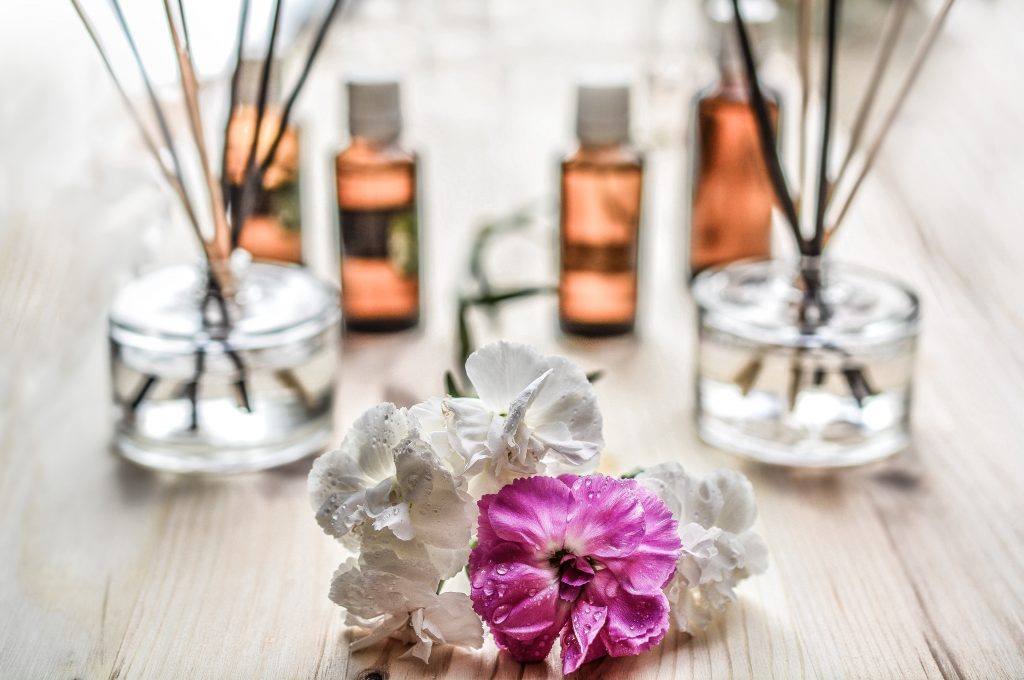Aromatherapy also referred to as “essential oil therapy”, is a holistic treatment that uses aromatic plant oils to promote well-being and health.
Using the aroma of various essential oils, holistic aromatherapy takes advantage of the innate medicinal properties certain aromatic plants, flowers, and herbs possess. You may have heard about ancient cultures or continental natives centuries ago who used certain flowers & shrubs as healing agents.
This isn’t all about “alternative medicine” or “alternative therapy”, either.
In fact, there have been studies performed on various essential oil extracts showing the medicinal properties of these oils firsthand. For example, humidified essential lavender oil aromatherapy improved levels of pain, depression, anxiety, and created a sense of well-being in cancer patients. Additionally, aromatherapy massage improved overall comfort, reduced muscular tension, reduced pain, and helped promote relaxation in a study of female cancer patients.
Although there is a lot of noise in the fields of aromatherapy and essential oils, we’ll focus exclusively on the scientific evidence and the plants, flowers, and herbs we know can provide medicinal benefits from uses in aromatherapy.
Table of Contents
How Does Aromatherapy Work
Aromatherapy acts through skin absorption and smell inhalation (via. our olfactory bulb), depending on the release method used.
As of today, some popular release methods commonly used for aromatherapy include:
| Standard Diffusers | Nebulizing Diffusers |
| Bathing Salts | Lotions |
| Body Creams & Oils | Topical Application / Massage |
| Aromatic Clay Masks | Facial Steamers |
| Inhalers |
By combining one of these release mechanisms with your essential oil of choice (of which there are hundreds), you can begin to reap the benefits from the medicinal properties of that particular oil.
It’s important to note that essential oils, in general, aren’t FDA-Approved. This means that any oils you choose to use for aromatherapy purposes should be pure essential oils that are certified organic, without any synthetic materials present.
Carrier Oil for Diluting Concentrated Oil Extracts
Depending on the type of release and/or application method, if an essential oil extract is in its extremely concentrated form, it must be diluted before application or use in aromatherapy.
This is accomplished through carrier oils, which are plant-based oils used to dilute concentrated extracts and “soften” their effect. They’re called carrier oils since they’re typically used for topical (skin) application, and because they “carry” the oil to your skin.
In the aromatherapy realm, body creams, body lotions, and aromatic oils applied for massage are typically already diluted with either the ingredients in the cream/lotion or standard carrier oils.
Popular Aromatherapy Essential Oils
Out of the hundreds of essential oils available, certain oils attract more attention than others due to their pleasant smell, relative effectiveness, or even just personal preferences.
Some popular essential oil aromatherapy types include:
| Frankincense | Bergamot |
| Sage | Lemongrass |
| Eucalyptus | Peppermint Oil |
| Lavender | Lemon Oil |
| Tea Tree Oil |
You may have heard of a number of these due to their popularity.
Bergamot oil, for example, is a popular scent in high-end shampoo & body wash products. On the other hand, eucalyptus is commonly used in steam rooms throughout health clubs and various gyms.
Health Benefits of Aromatherapy
As cited previously, there are scientific studies detailing the medicinal properties of a number of essential oils and the health benefits they may provide.
Some of the health benefits of aromatherapy include:
- Stress Relief
- Anxiety Relief
- Inflammation & Pain Management
- Managing Insomnia
- Managing Depression
- Cancer Treatment
- Allergies
- Asthma Relief
- Fatigue Reduction
Professional Education in Aromatherapy
Anyone with an interest in using scientific aromatherapy to treat patients and improve their well-being has opportunities for both education and advancement. The Alliance of International Aromatherapists (AIA) is an organization dedicated to educating aromatherapists and healthcare professionals globally.
Founded in 2006, AIA is a 501(c)(3) non-profit with a goal of expanding awareness and access to aromatherapy treatments around the world. Their focus on continued scientific research and improving professional standards is a great approach in our modern age.
The Link to Massage Therapy
When someone thinks of aromatherapy, one of the most frequent connections made is to massage therapists and their use of aromatic essential oils during massage.
This can be excellent as a complementary therapy. Depending on the types of oils used, a massage therapist could combine aromatherapy with massage therapy for an overall greater effect on the client.
Essentially, a massage therapist can tailor a massage session to a particular client by picking out oils specifically for their scientifically-proven medicinal benefits. This provides a win-win situation for both the massage therapist and the client simultaneously.
Aromatherapy Products
There are hundreds of products on the market today with the sole purpose of providing effective & efficient release techniques for use in aromatherapy.
Some of the most popular products could include:
| Aromatherapy Diffusers | Aromatherapy Candles |
| Humidifiers | Aromatherapy Jewelry |
| Perfumes | Reed Diffusers |
| Aromatherapy Gift Ideas | Aromatherapy Sprays |
Commonly Asked Questions
What is aromatherapy used for?
Aromatherapy is used to relieve stress, promote relaxation, and help treat certain mental and physical conditions such as depression, insomnia, allergies, fatigue reduction, burns, and high blood pressure.

